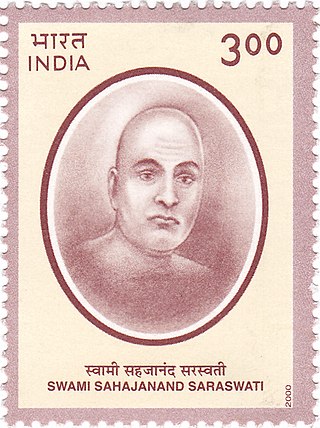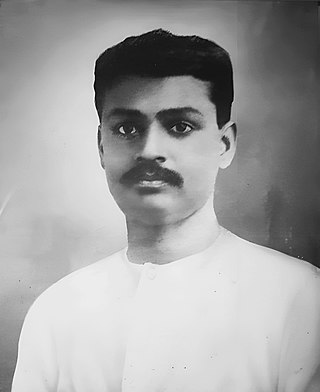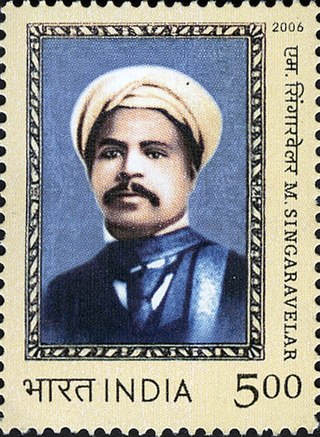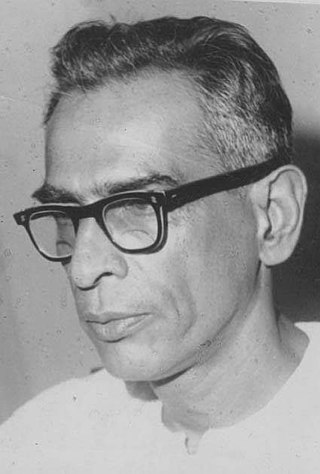This article needs additional citations for verification .(September 2020) |
Madari Pasi | |
|---|---|
| Born | Hardoi, Uttar Pradesh, India |
Madari Pasi was a leader of the Indian peasant movement Eka Movement. [1] [2] [3]
This article needs additional citations for verification .(September 2020) |
Madari Pasi | |
|---|---|
| Born | Hardoi, Uttar Pradesh, India |
Madari Pasi was a leader of the Indian peasant movement Eka Movement. [1] [2] [3]
Eka Movement had been an offshoot of Indian National Congress, associated with Non-Cooperation Movement(NCM). But when the Congress was busy in the nationwide Non Cooperation Movement, it somewhat neglected the ongoing Eka Movement. It was this time when Madari Pasi established himself as a charismatic grassroot leader among the kisans involved in the Eka Movement. He united the kisans and petty zamindars from all religions and castes. He pushed the movement in to a violent route. He violently assaulted zamindars, karindas, taluqdars and thikadars and even imprisoned them in their own homes. He began to distribute landowning rights to tenants and petty landholders. His name was associated with dread. [4] Sitapur, Barbanki and Hardoi districts of UP saw aggressive peasant movement called Eka movement, led by Madari Pasi and British Government suppressed the movement within a year but failed to arrest the leader Madari Pasi. [5]
Gandhi with his NCM-Khilafat Movement, after hearing about the violent activities of the Eka Movement members, disassociated himself from the Eka Movement. After losing the support of Congress, it became much easier for the British colonial authorities to suppress it. By 1922 the movement was completely suppressed. After the crackdown by the colonial authorities, the movement went underground. He tried to associate the peasants with Hindustan Socialist Republican Association. Even though there is a confusion, it is generally believed that Madari Pasi died on March 27 or 28 in 1931 while underground. [6]

All India Kisan Sabha, is the peasant or farmers' wing of the Communist Party of India, an important peasant movement formed by Sahajanand Saraswati in 1936.

Sahajanand Saraswati ( was an ascetic, a nationalist and a peasant leader of India. Although born in United Provinces, his social and political activities focussed mostly on Bihar in the initial days, and gradually spread to the rest of India with the formation of the All India Kisan Sabha. He had set up an ashram at Bihta, near Patna, Bihar carried out most of his work in the later part of his life from there. He was an intellectual, prolific writer, social reformer and revolutionary.
Baba Ram Chandra (1864/1875–1950) was an Indian trade unionist who organised the farmers of Awadh, India into forming a united front to fight against the abuses of landlords in 1920s and 1930s. He was also an influential figure in the history of Fiji, and owed his inspiration to take up the cause of the down-trodden to his 12 years as an indentured labourer in Fiji and to his efforts to end the indenture system. He is one of the prime characters in Kamla Kant Tripathi's history based novel "Bedakhal".

Ramavriksha Benipuri was a freedom fighter, Socialist Leader editor and Hindi writer. He was born in a small village named Benipur in Muzaffarpur district in a Bhumihar family in the Indian state of Bihar. He had spent nine years in prison for fighting for India's independence. He was the founder of Bihar Socialist Party in 1931 and Congress Socialist Party in 1934. He served as the president of Patna District Congress Committee of Indian National Congress from 1935 to 1937 during the 1937 Indian provincial elections. He was elected as the Member of the Legislative Assembly (India) from Katra North in 1957. In 1958, he was elected as the Syndicate Member of Bihar University, Muzaffarpur.

Colonial Assam (1826–1947) refers to the period in the history of Assam between the signing of the Treaty of Yandabo and the Independence of India when Assam was under British colonial rule. The political institutions and social relations that were established or severed during this period continue to have a direct effect on contemporary events. The legislature and political alignments that evolved by the end of the British rule continued in the post Independence period. The immigration of farmers from East Bengal and tea plantation workers from Central India continue to affect contemporary politics, most notably that which led to the Assam Movement and its aftermath.

Sachindra Nath Sanyal was an Indian revolutionary and co-founder of the Hindustan Republican Army that was created to carry out armed resistance against the British Empire in India. He was a mentor for revolutionaries like Chandra Shekhar Azad, Jatindra Nath Das, and Bhagat Singh.

Malayapuram Singaravelu, also known as M. Singaravelu and Singaravelar, was a pioneer in more than one field in India. In 1918, he founded the first trade union in India. On 1 May 1923 he organised the first ever celebration of May Day in the country. Singaravelar was a major leader of the Indian independence movement, initially under the leadership of Gandhi, but later, joining the budding communist movement. In 1925, he became one of the founding fathers of the Communist Party of India; and chaired its inaugural convention in Kanpur. Though the British Government arrested him along with other leaders on charges of conspiring to wage war against the Crown, he was set free, soon after, on account of his failing health. Singaravelar was also a path-breaking social reformer who in his early life took to Buddhism, seeing it as a weapon against the evil of untouchability, which was particularly severe in the 19th-century India. He was also in the forefront of Self respect movement, in the Madras Presidency that fought for equal rights for backward castes. Though in his advanced years, he withdrew from active politics, Singaravelar remained a staunch advocate of the causes he had pioneered till his death at the age of 85.
Bhumihars, also locally called Bhuinhar and Babhan, are a Hindu caste mainly found in Bihar, the Purvanchal region of Uttar Pradesh, Jharkhand, the Bundelkhand region of Madhya Pradesh, and Nepal.
Jamuna Karjee (1898-1953) was an Indian independence activist.
Karyanand Sharma (1901–1965) was a nationalist and peasant leader who led movements against zamindars and the British.

The Pasi is a Dalit (untouchable) community of India. Pasi refers to tapping toddy, a traditional occupation of the Pasi community. The Pasi are divided into Gujjar, Kaithwas, and Boria. They are classified as an Other Backward Class in Andhra Pradesh and Telangana. They live in the northern Indian states of Bihar and Uttar Pradesh.

Hare Krishna Konar was an Indian Marxist revolutionary, political theorist, charismatic peasant leader and politician. Konar was a founding member of the Communist Party of India (Marxist), the figurehead behind India's first land reforms, and the chief architect of the West Bengal land distribution. Between the 1960s and 1970s, he became one of the principal leaders of the Communist movement in India. In 1932, due to his involvement in the Begut Robbery Case of the Jugantar Party, Konar was deported to the Cellular Jail of the Andaman for 6 years at the age of 18, there he took part in the first hunger strike and in 1935 he founded the Communist Consolidation and led the historical second hunger strike.
Eka Movement or Unity Movement is a peasant movement which surfaced in Hardoi, Bahraich and Sitapur during the end of 1921. Initially started by Congress and the Khilafat movement, it was later headed by Madari Pasi. The main reason for the movement was high rent, which was generally higher than 50% of recorded rent in some areas. Oppression by thekedars who were entrusted to collect rent and practice of share rent also contributed to this movement.
Rajputs in Bihar are members of the Rajput community living in the eastern Indian state Bihar. They are popularly known as Babu Saheb, a term that is mainly used in Bihar, the Purvanchal region of Uttar Pradesh, and Jharkhand. They traditionally formed part of the feudal elite in Bihari society. Rajputs were pressed with the Zamindari abolition and Bhoodan movement in post-independence India; along with other Forward Castes, they lost their significant position in Bihar's agrarian society, leading to the rise of Other Backward Classes (OBCs).

The Zamindars of Bihar were the autonomous and semi-autonomous rulers and administrators of the Mughal subah of Bihar and later during British rule. The zamindars of Bihar were numerous and could be divided into small, medium and large depending on how much land they controlled. Within Bihar, the zamindars had both economic and military power. Each zamindari would have their own standing army which was typically composed of their own clansmen.

Triveni Sangh was a caste coalition and political party established in Shahabad District of Bihar in pre-independence India to voice the political solidarity of "middle peasant castes" as well as to carve a space in democratic politics for the lower castes. The date of formation of the Triveni Sangh has been variously stated. Some sources have said it was the 1920s but Kumar notes recently discovered documentation that makes 1933 more likely, while Christophe Jaffrelot has said 1934. The leaders associated with the formation of this front were Yadunandan Prasad Mehta, Shivpujan Singh and Jagdev Singh Yadav.
The Backward Caste movement in Bihar can be traced back to the formation of Triveni Sangh, a caste coalition and political party, in the 1930s, which was revived after the introduction of land reforms in the 1950s aimed at removing intermediaries from agrarian society. But, this drive could not succeed in bringing long-lasting changes in the condition of lower strata of society, as they lacked political representation and economic power. The period since land reform included caste conflicts and the class struggle which eventually led to a transfer of absolute political power in the hands of Backward Castes, who had been kept away from it earlier. The class struggle succeeded the struggle of some of the Upper Backward Castes against the sacerdotal authorities for improvement in their ritual status. By the 1990s, the conflict between upper-castes and the lower-castes continued, with nearly 17 massacres taking place during this time period. But with the advent of politics of social justice and the Janata Dal in the 1990s, the lower caste became more active politically.
The name Pasi is composed of two words Pa and asi (sword), implying thereby one who hold a sword in his hand or in other words a soldier. Another etymology is that the name comes from the Sanskrit pashika, "one who uses a noose." The Pasi are said to have used nooses for climbing trees.

Dalits in Bihar are a social group composed of many Scheduled Castes, placed at the bottom of the "caste-based social order". The Dalits also include some of the erstwhile untouchable castes, who suffered various forms of oppression in the feudal-agrarian society of Bihar. Some of the Dalit castes have specific cultural practices, which differ from those of orthodox Hinduism.
Mata Badal Koeri was an Indian peasant leader, who was one of the founding member of Oudh Kisan Sabha during 1920 Non-cooperation movement. He, along with leaders like Baba Ram Chandra, Jhinguri Singh and Kedar Nath established Oudh Kisan Sabha in 1920, to work in Pratapgarh district. The prime motive of these leaders in establishing this organisation was to reorganise all the defunct Kisan Sabhas and make the members of these Sabhas (councils) as active part of Non Cooperation movement. He was a resident of Rae Bareli district. The Oudh Kisan Sabha, with which he was associated was third such council in the region. Author Majid Hayat Siddiqi considers Matabadal Koeri to be one of the three chief lieutenants of Awadh Kisan Sabha.